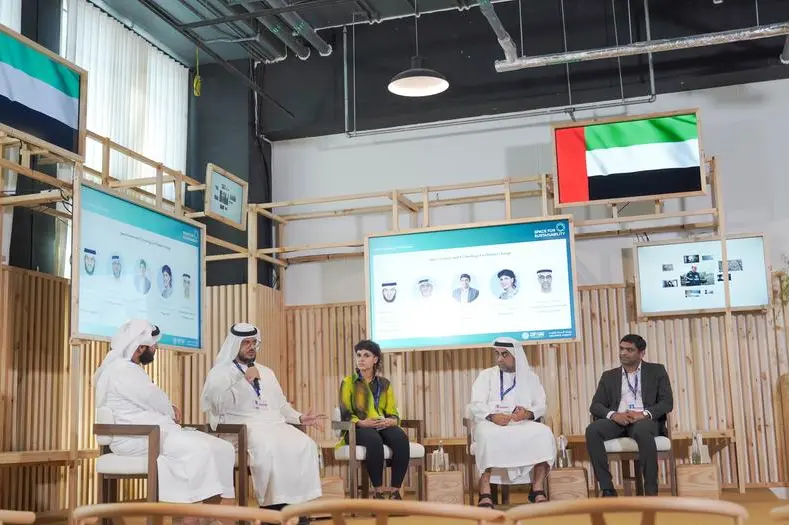PHOTO
Abu Dhabi, UAE: In partnership with Bayanat, the UAE Space Agency announced the launch of the operational phase of Geo-Spatial Analytics Platform, on the sidelines of its initiatives in organising the Space Pavilion’s first participation at COP28.
Today’s accomplishments are as result of the UAE government transformational project that was kicked-off on Q3 2022 and the partnership that was announced during the Abu Dhabi Space Debate 2022 . The platform will include three key services: facilitation an access to satellite imagery from international space agencies and a number of world-leading private companies, offering Artificial Intelligence (AI)-based algorithms to generate analytics reports, and a market-place for space applications and AI Space-Based Models. These services will help to attract leading innovators, accelerate the development process of space products, and contribute to the diversification of the UAE's economy.
His Excellency Salem Butti Al Qubaisi, Director-General of UAE Space Agency, said: “The operational phase of the Geo-Spatial Analytics Platform is a significant strategic step towards strengthening the UAE’s position as a major player in the global space industry and supporting sustainability. The platform will certainly contribute to improving our understanding of Earth and climate changes, and developing scientific and technological capabilities to combat these changes.”
Al Qubaisi added: “By providing accurate and comprehensive space data to scientists and institutions, this platform will enhance efforts to face global challenges such as climate change and natural disasters. This reflects the UAE’s commitment towards innovation and leadership in space exploration, and consolidating its position as a hub for scientific and technological excellence in the region and the world.”
His Excellency Ibrahim Hamza Al Qasim, Deputy Director-General of UAE Space Agency, said: “The Geo-Spatial Analytics Platform will offer major technical development in the field of remote sensing and Earth observation, as it is distinguished by its ability to provide direct and rapid access to satellite data, which opens new horizons for scientists, researchers, and public and private institutions.”
Al Qasim added: “It will also contribute to developing innovative solutions to meet national and global challenges more efficiently, such as monitoring climate change, managing natural resources, and responding to natural disasters, by facilitating analyses and forecasts based on accurate satellite data, to create early warning systems and enhance rapid response.”
Meanwhile, the UAE Space Agency signed a Memorandum of Understanding (MoU) with the Maldives, to form the basis for bilateral cooperation aimed at benefiting from the Geo-Spatial Analytics Platform’s services, to build an atlas of loss and damage for the Maldives. The MoU aims to enhance its capabilities in analysing and forecasting challenges related to climate change and natural disasters.
The Geo-Spatial Analytics Platform is one of the projects of the Space Data Center, which aims aims to provide scientists, researchers, public and private entities, startups, and community members with access to satellite data to develop solutions for national and global challenges through space applications and value-added services (VAS).
The Geo-Spatial Analytics Platform will include marketplace offering advanced space-based applications for providing suitable solutions for addressing national and global challenges such as environment monitoring, climate change. environment monitoring, climate change .
It will provide machine learning models and advanced AI tools, making it easier for users to apply these models in their own fields. It will also allow users to benefit from AI model training programs without the need to write programming codes, making it a valuable tool to facilitate access to AI technologies for different users.
The platform will contribute to promote the application that are developed by startups and entrepreneurs. Also, all UAESA funded projects in earth observations will be hosted in this platform..
The UAE Space Agency led the first participation of the Space Pavilion in the 28th Conference of the Parties of the UNFCCC (COP28), from 30 November to 12 December 2023, under the slogan ‘Space for Sustainability’. The Space Pavilion hosted a series of presentations and more than 60 panel sessions focusing on the use of satellite data, space technology for sustainability, mitigation and adaptation to climate change, the latest sustainable technologies and initiatives in the space sector, financing space-climate initiatives, and discussing methane and Greenhouse gases.
About the Space Data Center
Space Data Center is a digital platform that provide scientists, scholars, public and private entities, start-ups, and community members with access to space data to develop algorithms and solutions for addressing national and global challenges. The Space Data Center aim to provide an innovative ecosystem to utilize space data and technologies to address global sustainability challenges, and boost the numbers of companies and patents in space industry. This project also aim to attract leading innovators, accelerate the development process of space products, increase productivity in scientific research to provide people with a better life, by utilizing space-related applications and services and contribute to the diversification of the UAE's economy. The Space Data Center consists of three key pillars including Emirates Mars Mission (EMM) Science Data Center, Space Analytics and Solutions (SAS) Program, and the Geo-Spatial Analytics Platform (GIQ).
The Space Data Center is part of the transformational projects announced by the UAE’s government, aiming to realize the vision of His Highness Sheikh Mohammed bin Rashid Al Maktoum, Vice President and Prime Minister of the UAE, to focus on creating the world’s best and most active economy.




















